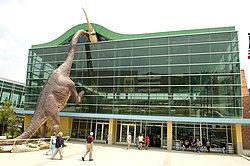 | |
 Welcome Center and Brachiosaurus, installed in 2009 | |
 | |
| Established | 1925 |
|---|---|
| Location | 3000 North Meridian Street, Indianapolis, Indiana, 46208-4716, U.S. |
| Type | Children's museum |
| Visitors | 1.3 million (2019)[1] |
| President | Jennifer Pace Robinson |
| CEO | Jennifer Pace Robinson |
| Public transit access | |
| Website | www |
The Children's Museum of Indianapolis is the world's largest children's museum. It is located at 3000 North Meridian Street, Indianapolis, Indiana in the United Northwest Area neighborhood of the city. The museum is accredited by the American Alliance of Museums. It is 472,900 square feet (43,933.85 m2) with five floors of exhibit halls, and receives more than one million visitors annually. Its collection of over 130,000 artifacts and exhibit items is divided into two domains: Arts & Humanities and the Natural Sciences. Among the exhibits are simulated Cretaceous and Jurassic dinosaur habitats, a carousel, a steam locomotive, and the glass sculpture Fireworks of Glass Tower and Ceiling. The museum's focus is family learning; most exhibits are designed to be interactive.[2][3]
Founded in 1925 by Mary Stewart Carey with the help of Indianapolis civic leaders and organizations, it is the fourth-oldest such institution in the world. The current site became home for the museum in 1946; the current building was constructed in 1976 and has had four major expansions since then. The museum hosts thousands of activities annually, including plays at the Lilly Theater, classes and workshops for school children, traveling exhibits, and fund-raising events. With a 2008 budget of $28.7 million, it has 400 employees and 1,500 volunteers. Its financial stability is ensured by a large endowment that was first established in the 1960s and is governed by a board of trustees. In May 2021, the museum announced Jennifer Pace Robinson, a 29-year veteran of the museum, as its new president and CEO.
- ^ "Most Popular Indianapolis-Area Attractions". Indianapolis Business Journal. Retrieved November 11, 2020.
- ^ "Mission". The Children's Museum of Indianapolis. Retrieved July 28, 2014.
- ^ Wolf, Barbara; Wood, Elizabeth (Spring 2012). "Integrating Scaffolding Experiences for the Youngest Visitors in Museums" (PDF). Journal of Museum Education. 37 (1). Museum Education Roundtable: 31–32. doi:10.1080/10598650.2012.11510715. hdl:1805/12157. S2CID 114290114. Retrieved July 27, 2014.
Over the past ten years, The Children's Museum of Indianapolis has developed and refined its family learning initiatives and strategies. This work included an institution-wide demonstrable shift away from child-centered experiences, to those where families (defined as at least one adult and one child with an ongoing relationship) collaborate on problems, enhance the experience through personal connection, and build on each other's participation.
